Academics, politicians and the media have reduced Canadian history to a series of regrettable events requiring abject apology and compensation. In doing so they downplay, ignore or deny the many admirable aspects of our past that remain worthy of celebration and respect. But what of those events that truly are lamentable today? Greg Piasetzki looks at Canada’s Chinese head tax and the role played by Canada’s first prime minister, Sir John A. Macdonald, commonly considered the racist villain of this policy. Piasetzki’s careful scholarship reveals in full what Macdonald actually said and did on this issue, and recounts his efforts to protect minority rights in Canada a century before the Charter of Rights and Freedoms. 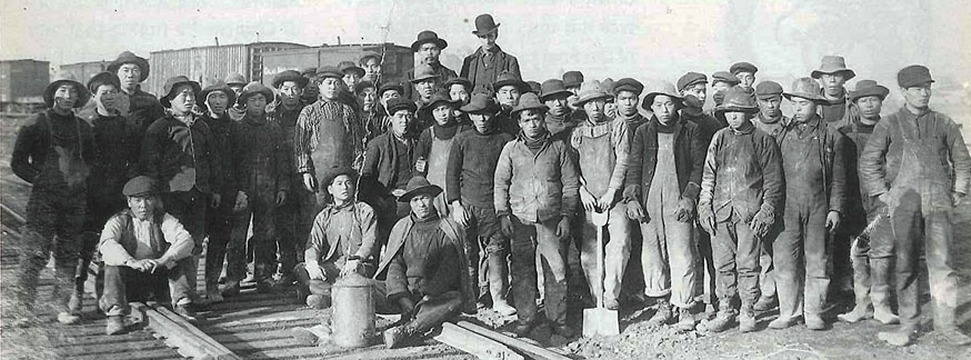
The Truth About the Chinese Head Tax
and Sir John A. Macdonald
www.hillmanweb.com/chinese/epic/tax.html
Off-Site Ref: C2C Journal
Sir John A. Macdonald’s leadership and vision were crucial to achieving Confederation in 1867 as well as Canada’s later expansion to include British Columbia and the northwest territories of Rupert’s Land. His government also overcame steep financial, political and engineering hurdles to build a railway joining these disparate components into a viable country. As biographer Richard Gwyn put it, “no Macdonald, no Canada.”
Lately, however, the nation-building achievements of Canada’s first prime minister have been replaced by something less inspiring. His memory has been remolded to represent all that is lamentable about Canada’s past. Reminiscent of the ancient Scottish Highlands funeral custom of sin-eating – in which a village outcast figuratively consumed the sins of the departed by eating a piece of bread in the presence of the dead body and was then banished by the grievers – Macdonald has been forced to ingest all of early Canada’s political sins, regardless of his personal responsibility.
Macdonald has been accused of deliberately starving native populations on the Prairies in the early 1880s for political purposes. Yet the famine resulted from a collapse in the buffalo herds due to over-hunting, a changing climate and competition for grazing land. And Macdonald’s government responded with the largest relief program Canada had ever seen, saving many thousands of Indigenous lives. He has also been blamed for creating the Indian Residential School system, which others established long before he became prime minister. And he is now considered responsible for the many complaints and shortcomings experienced by Indigenous children who attended such schools. This despite compulsory attendance not being introduced until the 1920s, nearly three decades after his death, and often involving just one year of schooling as late as the 1950s.
More recently, Macdonald has been handed responsibility for Canada’s racist immigration policies, in particular the Chinese head tax. It was imposed – reluctantly – in 1885 by Macdonald’s Conservative government, levying a fee of $50 on Chinese workers seeking to immigrate to Canada. But his Liberal successor, Sir Wilfrid Laurier, raised the head tax to $100 and later $500. And in 1923 Prime Minister William Lyon Mackenzie King, another Liberal, replaced the head tax with an outright ban on all Chinese immigration. Yet it is Macdonald alone who takes the blame. Earlier this month, for example, The Globe and Mail’s page 2 feature, “Moment in Time,” recalled the head tax and pointed to Macdonald for reflecting “racist anti-immigration feelings at the time.” There’s no mention of Laurier, King or anyone else.
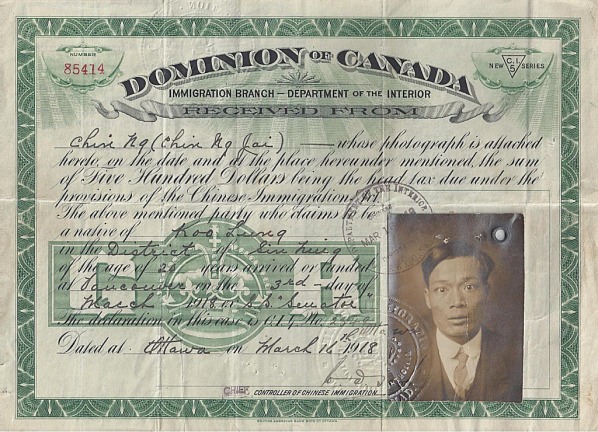
Ingesting the blame: Macdonald has been assigned responsibility for Canada’s racist immigration policies of the late 1800s and early 1900s.
Depicted, a Chinese Immigration Certificate, issued to Ching Ng (Chin Ng Jai) for the then-huge cost of $500 in March 1918 – when Liberals held office.As with Indigenous starvation and residential schools, laying responsibility for the Chinese head tax at Macdonald’s feet is both historically inaccurate and morally unfair. A careful examination of the evidence, including Macdonald’s statements and actions alongside those of his political contemporaries, reveal he was never a proponent of a head tax or any other racist innovation. His instincts always leaned to protecting minority rights.
As a result, Macdonald resisted demands for anti-Chinese policies from his provincial and federal opponents for many years. His delaying tactics were often so obvious that critics deemed them a “slap in the face.” When he was finally unable to hold off these forces any longer, Macdonald contrived to set the tax so low that it didn’t actually deter Chinese immigration. While Canada’s head tax later became much more significant and malign, this was not Macdonald’s doing. Canada’s founding father has once again been forced to consume the sins of many other historical figures.
From Gold Rush to Yellow Peril
At the start of the 19th century, China was the wealthiest empire in the world, yet with no interest in global relations. Its view of Europeans can be seen in Emperor Qianlong’s response to a British envoy sent to China in 1793 to discuss freer trade relations:
“Should your vessels touch the shore, your merchants will assuredly never be permitted to land…[and] your barbarian merchants will have had a long journey for nothing. Do not say that you were not warned in due time! Tremblingly obey and show no negligence!”
Despite the bluster, China was unable to keep the foreigners at bay. Two wars with European powers over opium in the early 1800s led to a horrific civil war known as the Taiping Rebellion in which an estimated 80 million Chinese died. The economic dislocation and political upheaval forced many Chinese workers to look beyond their own borders for a livelihood.
The presence of so many Chinese migrants in the small, nascent colony of British Columbia led to frequent complaints from white society. Beyond cultural differences, the biggest issue was that the Chinese proved to be very hard workers willing to accept lower wages than whites.
The discovery of gold in California in 1849 proved just such an opportunity. The Gold Rush drew 70,000 eager prospectors from around the world, including an estimated 20,000 Chinese workers. San Francisco was a mere six to eight-week journey by sail or steam from Hong Kong, compared to the arduous four-month overland trek from the east coast of the United States. So began North America’s often tempestuous relationship with Chinese immigrants.
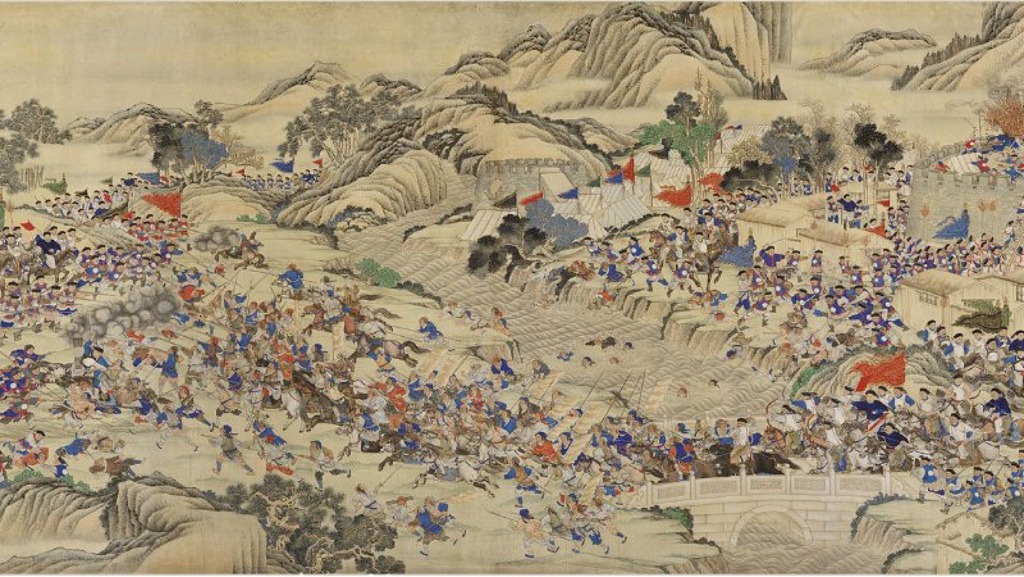
China’s Taiping Rebellion of 1850, possibly the bloodiest civil war in human history,
encouraged hard-pressed Chinese to seek refuge and a livelihood far beyond their own shores.
The nascent colony of British Columbia was one destination.In 1858, the experience of San Francisco was replicated in Canada with the discovery of gold in the Fraser River Canyon. Of the 30,000 hopefuls who arrived, an estimated 5,000 or so were Chinese workers. And when the rush ended abruptly in 1865, the colony found itself heavily in debt and without viable economic prospects. It was also riven by racial strife as a result of the thousands of Chinese workers who remained.
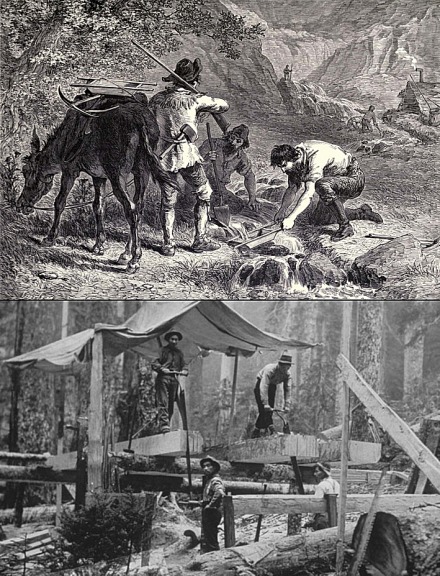
The discovery of gold in California in 1849 (top) and the Fraser River Canyon in 1858 (bottom)
drew thousands of Chinese workers to North America
– and marked the beginning of at-times turbulent relationships between the whites and Chinese immigrants.The presence of so many Chinese migrants in the small, nascent colony of British Columbia led to frequent complaints from white society. Beyond cultural differences, the biggest issue was that the Chinese proved to be very hard workers willing to accept lower wages than whites. The popular press of the time is full of allegations they intended to return to China with their savings after three to five years. As such, they were temporary workers filling jobs that might otherwise support a colonist intending to stay permanently. There were also complaints they smoked opium, didn’t pay their fair share of taxes and only frequented businesses owned and operated by other Chinese people.
Such popular prejudices led to repeated demands for political action. In 1871 The Weekly British Colonist newspaper proposed a $50 head tax on Chinese immigrants. Such a notion would become a familiar refrain throughout the colony as anti-Chinese sentiment grew prior to B.C. joining Confederation.
British Columbia Joins the New Nation
One of Macdonald’s foremost goals as prime minister was to bring B.C. into Canada. To accomplish this he offered exceedingly generous terms, including a promise to build a transcontinental railway within a decade and to assume the colony’s large debt. The province would also be given the right to send three senators and six MPs to Parliament based on an estimated population of 10,000 whites, 10,000 Chinese and 40,000 Indigenous people. No other province was allowed to use its Indigenous or Chinese populations in such calculations. In effect, B.C. was given ten times the political representation its population would justify elsewhere in Canada.
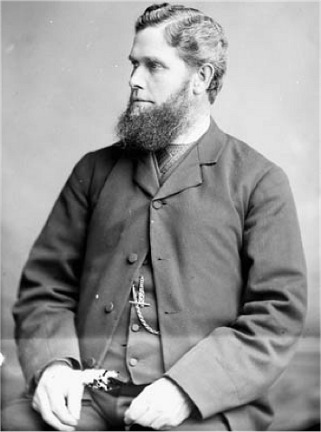
“First professional anti-Chinese agitator”: Noah Shakespeare, leader of the B.C.’s Workingmen’s Protection Association,
actively lobbied against Chinese immigration; he was instrumental in implementing a provincial $10 quarterly tax
on all Chinese residents over the age of 12.
The tax was ruled unconstitutional by a provincial judge appointed by Macdonald.In winning over B.C. interests, however, Macdonald also inherited its fractious and racially-charged political culture. As University of Victoria law professor John McLaren explained in a 1991 article in the Manitoba Law Journal, “Between 1878 and the late 1880s, the Legislature of British Columbia enacted or approved a series of discriminatory measures designed either to bar the entry of Chinese into the Province, or to make life intolerable for those already resident.”
The first of these was 1878’s An Act to Provide for the Better Collection of Provincial Taxes from the Chinese, which imposed a quarterly $10 tax on all Chinese residents over the age of 12. A key figure in this and subsequent racist laws was Noah Shakespeare, the Victoria, B.C.-based leader of the Workingmen’s Protection Association (WPA), an early labour association whose primary purpose was to lobby for restrictions on Chinese immigration.
After the law was passed, Shakespeare got himself appointed tax collector on a commission basis; that is, he received a share of the taxes he collected. When Chinese residents refused to pay, he eagerly seized their property. Shakespeare went from leader of the WPA to mayor of Victoria and then MP in Ottawa, where he continued his campaign. Historian Patricia E. Roy has called him B.C.’s “first professional anti-Chinese agitator.”
To their credit, Chinese residents launched various political and legal defences against this discriminatory legal movement. In 1878, after one of Shakespeare’s assistants seized the property of a merchant named Tai Sing, the victim sued. Tai Sing v Maguire was heard in the Supreme Court of British Columbia by Justice John Hamilton Gray. Gray struck down the Chinese tax act as intruding on federal jurisdiction over immigration, trade, commerce and treaty-making. Beyond the constitutional aspects, Gray also had this to say about the legislators’ motives: “From the examination of its enacting clauses, it is plain that it was not intended to collect revenue, but to drive the Chinese from the country.”
We will enjoy here that which is the great test of constitutional freedom – we will have the rights of minorities respected.
In all countries the rights of the majority take care of themselves, but it is only in countries like England…that the rights of minorities are regarded.’In another case involving anti-Chinese municipal action, R v Mee Wah, Chief Justice Mathew Baillie Begbie also decided that he need not rely solely on a lack of constitutionality to rule against it. That it turned on a matter of explicit racial discrimination was sufficient, he said, noting that the ordinance in question “only operates against a special race” and was therefore illegal.
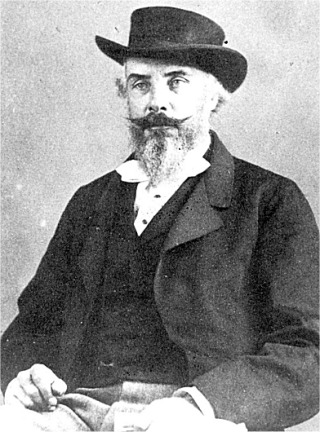
Protecting the minority: Chief Justice Mathew Baillie Begbie
– another of Macdonald’s appointees – ruled against an anti-Chinese municipal action,
reasoning it “only operate[d] against a special race” and was therefore illegal.The resolutions of these and other cases demonstrate the early Canadian court system’s admirable and robust defence of individual and minority rights in the face of rampant local prejudice. That this came long before the appearance of Canada’s Charter of Rights and Freedoms should underline the sense of fairness and justice inherent to the British parliamentary and justice systems. Note also that Macdonald was at the apex of this system in Canada, having appointed Justices Gray, Begbie and all the other judges in these cases.
As for his own thoughts on human rights, already when debating Confederation in 1865 Macdonald had explicitly noted the importance of protecting minority rights under the British parliamentary system:
“We will enjoy here that which is the great test of constitutional freedom – we will have the rights of minorities respected. In all countries the rights of the majority take care of themselves, but it is only in countries like England, enjoying constitutional liberty, and safe from the tyranny of a single despot or of an unbridled democracy, that the rights of minorities are regarded.”
A Relentless Campaign of Prejudice
In addition to his obvious respect for minority rights, Macdonald was also a political pragmatist. With public support for the Canadian Pacific Railway (CPR) strong in B.C., and with Chinese labour essential to completing that project, Macdonald was able to keep anti-Chinese demands at bay until the early 1880s. When the issue of Chinese competition with white labour was raised in Parliament in 1882, Macdonald responded,
“No complaints have reached the Government of serious interference with white labor in British Columbia, from the influx of Chinese labor. In fact, there is such a want of white labor in British Columbia, that if you wish to have the railway finished within any reasonable time, there must be no such step against Chinese labor…At present it is simply a question of alternatives – either you must have this labor, or you cannot have the railway.”
As the CPR drew closer to its completion in 1885, and many thousands of Chinese workers would soon be released into the general labour force, the political aspects of this issue became far more difficult to contain. In 1884, the B.C. legislature passed an Act to Prevent the Immigration of Chinese, making it illegal for any Chinese person not already resident to enter B.C. This act was rightly vacated by Macdonald’s government under federal disallowance powers as unconstitutional. (Ottawa’s power to disallow provincial legislation on such grounds was much used in Macdonald’s time; today it remains on the books but has long since passed out of fashion.)
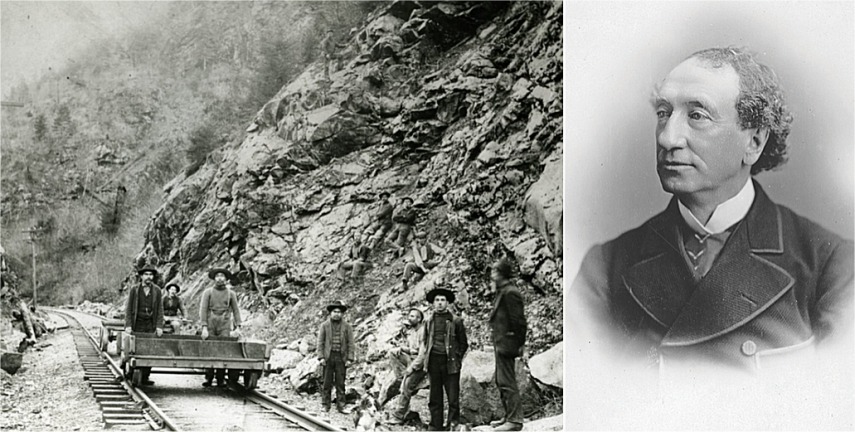
“Either you must have [Chinese] labor, or you cannot have the railway”:
To keep anti-Chinese demands at bay – including for a “head tax” on new immigrants
– Macdonald (right) argued that “to have the railway finished within any reasonable time,
there must be no [impediment] against Chinese labor.” His rationale worked, but only for a while.Also in 1884, to raise the heat on Macdonald’s government MP Shakespeare placed a motion before the House of Commons demanding a federal head tax on Chinese immigrants. (A similar motion the year before had been deferred.) His lengthy argument reviewed the experiences in other countries, including a complete ban imposed by the U.S., various head taxes in Australian territories and outbreaks of racial violence in the Philippines and Java. In speaking in favour of Shakespeare’s motion, MP Edgar Baker of Victoria reviewed the economic complaints against Chinese immigrants:
“Now, the Chinese work for $1 or $1.25 per day; and it must be remembered that they can live on from 10 to 15 cents per day, according to their mode of living, and they think they live most sumptuously. With white people it is different. Most of them have wives and families, and they can only expect to get the current wages of the place which are $2 to $2.50 per day…Shakespeare and Baker represented the unfortunate mainstream in B.C. politics regarding Chinese immigration. No doubt the politically astute Macdonald realized he could not ignore this issue forever. He tried to delay the inevitable by arguing that other public works projects, such as a Vancouver Island railway and a drydock, still required ample supplies of Chinese labour. To no avail. Eventually, he was forced to accept reality and offer Shakespeare a deal: if he withdrew his motion, a “Commission should be issued” to investigate Chinese immigration.They come for a brief period; they live on a very small amount of money; and after passing two or three years, they go back to China, taking with them from $750 to $1,000 each, and remain there for the rest of their lives…Another reason that makes them undesirable is, that they will not marry with any of the women in the country. If they did, I have no doubt a very desirable race would spring up.”
The Royal Commission
On July 4, 1884, Macdonald’s government appointed the Royal Commission on Chinese Immigration with two commissioners at its head. One was Joseph-Adolphe Chapleau, federal Secretary of State and former premier of Quebec. Chapleau was a close ally of Macdonald who later stuck by him during the violent protests in Quebec over the execution of Louis Riel. The other was Justice Gray, who had ruled in favour of Chinese interests in the Tai Sing case. The crafty Macdonald had thus given himself a twofer: in getting Shakespeare to drop his troublesome motion he had created a commission guaranteed to provide a result consistent with his own views. Early that August, Baker groused in the Victoria Daily Times that “it was an insult to us to have this commission appointed” with such liberal-minded folk in charge.
The commissioners reported that, contrary to popular belief, the Chinese paid their fair share of taxes and contributed significantly to the province’s development. Chinese workers had a well-deserved reputation for scrupulously observing the terms of contracts and were not disproportionately represented in criminal courts.A month later the commission convened in Victoria, hearing from 31 witnesses and accepting 29 written statements. One was from Chief Justice Begbie, who had ruled in the Mee Wah case. Begbie’s wry submission is a marvel of clear thinking on this heated topic. Responding to the query “Are they industrious, sober, economical and law-abiding, or are they lazy, drunken, extravagant or turbulent. Please answer the question fully,” Begbie had this to say:“Industry, economy, sobriety, and law-abidingness are exactly the four prominent qualities of Chinamen as asserted both by their advocates and their adversaries. Lazy, drunken, extravagant, and turbulent: this is, by the voices of their friends and foes, exactly what a Chinaman is not. This is, on the whole, I think, the real cause of their unpopularity. If Chinamen would only be less industrious and economical, if they would but occasionally get drunk, they would no longer be the formidable competitors with the white man which they prove to be in the labor market; there would be no longer be a cry for their suppression.”
The commission travelled to San Francisco and Portland as well as throughout B.C. collecting evidence and observing the local working and living conditions of Chinese workers. Then, working with remarkable speed, in just six months Chapleau and Gray produced a final report and an 800-page summary of evidence. Today, most royal commissions would struggle to hire staff in that time.
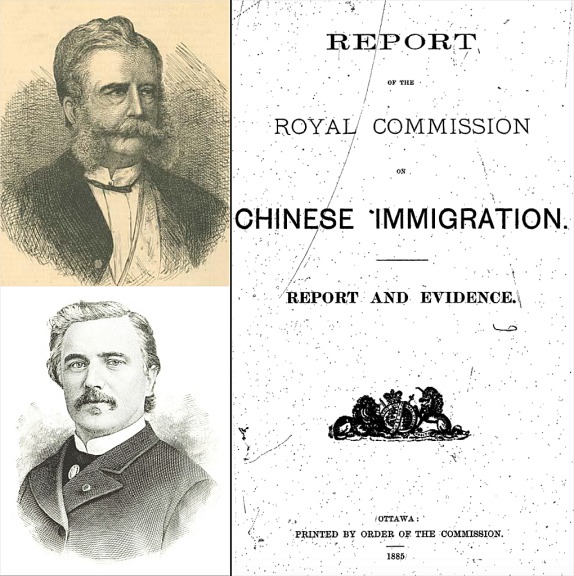
Macdonald appointed two allies – B.C. Supreme Court Justice John Hamilton Gray (top left)
and federal Secretary of State Joseph-Adolphe Chapleau (bottom left) –
to lead the 1884 Royal Commission on Chinese Immigration.
Travelling throughout the West Coast, they gathered evidence (right)
that the Chinese had a good reputation, paid taxes, upheld contracts and did not impede white immigration.
They recommended only a minimal measure – a $10 tax that would be put towards improving immigrants’ public health.The commissioners reported that, contrary to popular belief, the Chinese paid their fair share of taxes and contributed significantly to the province’s development. Chinese workers had a well-deserved reputation for scrupulously observing the terms of contracts and were not disproportionately represented in criminal courts. While many of them sent their considerable savings out of the country, so did citizens of other races. Finally, the commissioners found no evidence Chinese immigration had any impact on white immigration.
As for the opinion of white residents of B.C. on the “Chinese question,” Gray placed sentiment into three categories:
“1st Of a well meaning, but strongly prejudiced minority, whom nothing but absolute exclusion will satisfy;Given the weight of majority opinion (and ignoring the position of the “intelligent minority,” which his biographer claims aligned with his own personal views), Gray recommended the government consider a modest head tax of $10 annually, with the funds collected used to provide health inspections for the wellbeing of Chinese immigrants and workers. Improving public health for immigrants was certainly not what the anti-Chinese lobby had in mind. And the $10 rate was an order of magnitude lower than they were demanding. Baker called the final report a “slap in the face.”2nd An intelligent minority, who conceive that no legislation whatever is necessary – that, as in all business transactions, the rule of supply and demand will apply, and the matter regulate itself in the ordinary course of events;
3rd Of a large majority, who think there should be a moderate restriction based upon police, financial and sanitary principles, sustained and enforced by stringent local regulations for cleanliness and the preservation of health.”
Demands for a Chinese head tax were not solely a B.C. political concern. In eastern Canada, “pauper labour” (regardless of racial background) was also considered a significant problem for the labour movement because it undermined existing workers’ wages. This is reflected in the comments of Joseph Jackson, MP for Norfolk South in Ontario:
“Whereas, the system of importing pauper and Chinese labor to this country by the Government of the Dominion of Canada does not in any way protect the industries of our country or increase the wealth of the producers, but the importation of pauper and coolie labor in an already glutted labor market brings and increases poverty and its attending evils.”Such was the tenor of the times.
The Head Tax Becomes Reality
Both Gray and Chapleau were seasoned politicians, Gray having represented New Brunswick at the Charlottetown Conference in 1864 prior to becoming a judge. As such, they understood the extent of anti-Chinese/pauper labour sentiment, and the requirement to appear to be doing something about it. Their proposal for a modest head tax may have been contrary to their own private views, but it held the possibility of placating the “large majority” who wanted some action while inflicting as little damage as possible on the people targeted.
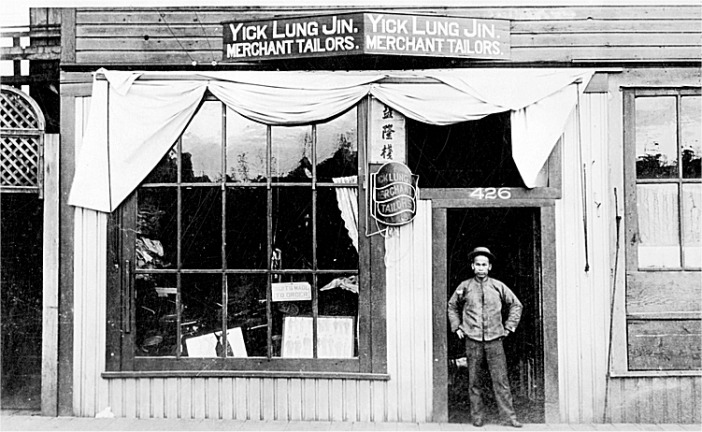
Doing the least he could get away with: Facing intense pressure from B.C.’s elites and the federal Liberals,
Macdonald increased the head tax from $10 to $50 but managed to work in exemptions
for students, diplomats, tourists, merchants and “men of science.”
Shown, Yick Lung Jin’s Merchant Tailors’ shop, Vancouver, B.C., ca. 1897.As it turned out, a $10 head tax was not sufficient to quiet B.C.’s vocal political class. Under the headline “The Chinese Must Go,” Victoria’s Times Colonist on March 6,1885 declared the initial proposal entirely inadequate. “The Commissioners, who had perhaps been appointed more in the interests of the Chinese than of the country, had framed their report accordingly,” the paper stated, adding, “the restrictive measures recommended are simply ridiculous.”
In negotiations with his opposition, Macdonald initially agreed to raise the head tax from $10 to $25. This was still not enough to quell political demands. “British Columbia members are pressing for an increase of the tax to $50,” the Times Colonist reported on April 14. Local sentiment carried the day and the tax was set at $50, a figure in line with some Australian territories. It applied only to new incoming Chinese immigrants – not those already present – and it exempted students, diplomats, tourists, merchants and “men of science,” all of which further suggest Macdonald and his allies kept the head tax as narrow and low as they could.
We can assume Macdonald compromised his personal beliefs in order to put out a political fire in B.C. Such are the ways of politics. And for this, he deserves some share of criticism. But it should be clear he was never a racist or believed such a thing represented good policy.And, though a sizeable increase from the original proposal, there’s good reason to believe its proponents thought this level remained a bearable burden on Chinese immigrants. Chinese workers could earn an estimated $300 to $350 per year in Canada, compared to $20 to $25 back home in China. It is possible Gray and Chapleau set their initial rate at $10 knowing this would give Macdonald room to raise it later without causing too much damage. At the same time, Macdonald agreed to exclude Chinese workers from voting in federal elections through the 1885 Electoral Franchise Act. Ironically, that law also allowed Macdonald to fulfill his promise to give the vote to property-owning Indigenous Canadians.
For or Against Your Own Bill?
Chapleau was charged with shepherding the subsequent legislation through Parliament. His uninspired approach suggests he well understood its flaws; he opened debate by reminding the House “that British soil was open to any member of the human family” and warning against insulting China with spurious immigration restrictions. Baker later remarked in the House of Commons that “one would almost imagine [that Chapleau] were in opposition to the Bill rather than in favour of it.” Regardless, the bill passed.
Despite his government’s lack of passion for a head tax, it remains an historical fact that Macdonald’s administration proposed and passed an inherently discriminatory law. That Canada’s founding father abided such a move doubtless arises from his instinctive pragmatism and regard for public opinion. We can assume Macdonald compromised his personal beliefs in order to put out a political fire in B.C. Such are the ways of politics. And for this, he deserves some share of criticism. But it should be clear he was never a racist or believed such a thing represented good policy. Often in debates in the House of Commons, Macdonald expressed a surprisingly modern view of minority rights and the need for a spirit of accommodation.
t
No racist: Despite allegations today, Macdonald was a pragmatist who had to govern under a majority opinion he did not share.
At left, a Canadian Illustrated News illustration depicting Amor de Cosmos forcing a Chinese immigrant to leave British Columbia, 1879;
at right, a Saturday Sunset political cartoon captioned,
“The same act which excludes orientals should open the portals of British Columbia to white immigration,” 1907.During the 1885 debate on the head tax, for example, Shakespeare provocatively raised the issue of Chinese inmates receiving special treatment in federal penitentiaries. Regulations required that all inmates have their hair cut short to reduce problems with vermin. But this rule was suspended for Chinese prisoners who wore their hair in a long, braided queue, which held cultural and religious significance. Shakespeare claimed this amounted to preferential treatment and should be stopped. Macdonald responded:
“I quite agree with my honourable friend that the same punishment should be meted out to the Chinaman, to the Indian, and to the white man, for the same crime, and that is the intention of the law. But…cutting off of the pigtail appendage is to the Chinese an additional punishment, not shared either by the white man or the Indian…If it is a greater punishment to the Chinaman than to the white man to have his hair removed, I do not think he should receive greater punishment than the white man.”The queues stayed.
Life after Macdonald
A $50 head tax imposed for reasons of political expediency was certainly insulting and unfair for incoming Chinese labourers. But it did not appear to pose a serious obstacle to their continued entry into Canada. Chinese immigration ebbed and flowed in the post-Gold Rush era. From 1876 to 1880 about 450 Chinese immigrants arrived each year. This jumped to nearly 4,000 per year from 1881 to 1884 during construction of the CPR.
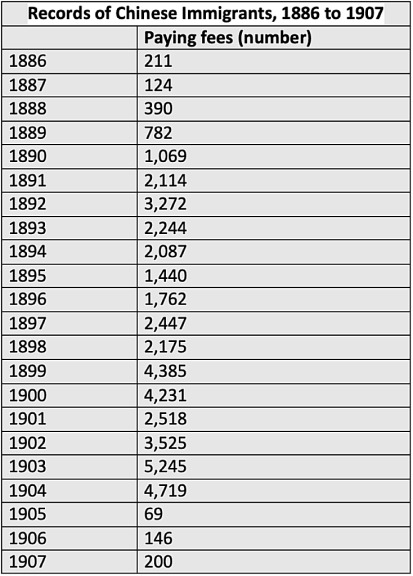
How much was too much? The historical record shows that Macdonald’s $50 head tax of 1885
did not seriously impede Chinese immigration.
The Liberals’ later increase to $500, however, accomplished what was intended.
(Source of data: Statistics Canada)Following the head tax’s imposition and the CPR’s completion in 1885, Chinese immigration fell back to a few hundred per year. It soon rebounded, however, and eventually exceeded pre-CPR levels. By 1890 immigration from China was over 1,000 per year, and then more than tripled within two years. As lamentable as Macdonald’s political compromise may have been in 1885, the $50 head tax was not an insurmountable barrier to immigration.
Chinese workers did not again pose a significant federal political issue until Laurier’s Liberal government took office in 1896. Then, growing pressure from B.C. once again pushed Ottawa to act. In 1901 Laurier doubled the head tax to $100 and appointed his own Royal Commission on Chinese and Japanese Immigration. Interestingly, in 1898 Laurier had also revoked the franchise Macdonald had given to some Indigenous Canadians. By 1903, despite the higher head tax, Chinese immigration reached an all-time high of 5,225.
Laurier’s Royal Commission, presumably picked with as much care as Macdonald’s, came to a dramatically different conclusion than Chapleau and Gray. Instead of dismissing local complaints, it declared “substantially true” hysterical claims from B.C.’s legislature that “the province is flooded with an undesirable class of people, non-assimilative and most detrimental to the wage earning class of people.” Such an influx, it went on, is “a menace to the health of the community” with the risk of “grave injury to the working classes.”
The commission reported that the head tax’s earlier doubling to $100 had been “ineffective” and recommended prohibiting all further immigration by Chinese through the signing of a formal treaty. In the meantime, it urged, the head tax should be raised to a prohibitively-high $500.
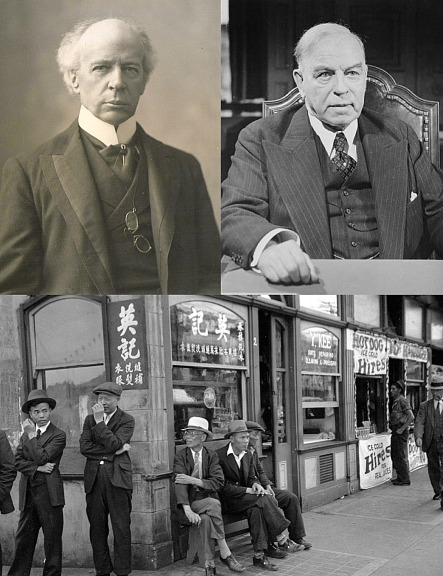
“A menace to the health of the community”: Macdonald’s Liberal successors Sir Wilfrid Laurier (top left)
and William Lyon Mackenzie King (top right) both viewed Chinese immigration as undesirable
and acted to crush it, with Laurier increasing the head tax to $500 and King completely prohibiting it in 1923.
Shown on bottom, the “bachelor society” of Chinese men, unable to reunite with their families following the 1923 law.
King’s ban lasted until 1947 – after the Second World War ended.Laurier, in making his case to the House of Commons, expressed a view of racial relations decidedly at odds with that of Macdonald:
The much larger figure of $500 – about one-and-a-half-year’s wages – proved to have the desired effect. Fewer than 100 Chinese migrants arrived on Canada’s shores in 1905. Chinese immigration gradually began to increase once again, however, and in 1923 Mackenzie King’s Liberal government prohibited Chinese immigration entirely, a ban that lasted until 1947.“The House is aware that in the Province of British Columbia there exists a very strong feeling against Asiatic immigration…in this regard the Province of B.C. is not at all isolated from other portions of the world…in fact, wherever the two races (Caucasian and Mongoloid) have come into contact the same feeling has manifest itself…everyone who has looked into the matter must come to the conclusion that this antagonism is based upon ethnical considerations, the difference between the two races. It seems impossible to reconcile them, and the conclusion of all who have considered the matter seems to be that the amalgamation of the two is neither possible nor desirable.”
Who Were the Real Racists?
Today, Macdonald is routinely labelled a racist for imposing the $50 Chinese head tax in 1885. Yet the truth is that he stalled imposition of a federal head tax for more than a decade following B.C.’s entry into Confederation. And he did so in the face of vociferous and repeated demands from the province’s political class.In truth, it was the Liberal governments that succeeded Macdonald’s Conservative administration – namely Laurier and King – who deliberately shut down Chinese immigration for reasons of overt racial prejudice.Macdonald’s first line of defence against discriminatory anti-Chinese policies was to appoint judges who would defend individual rights. He also used his federal power of disallowance to vacate contemptible provincial legislation. And he relied on economic arguments regarding the necessity of Chinese labour, a successful strategy until the completion of the CPR in 1885.
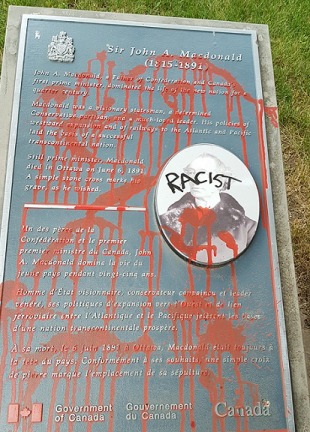
The villain is not here:
The historical record establishes that Macdonald was far from the real racist in dealing with the “Chinese question”
and that his policies did more to enable Chinese immigration than to discourage it,
as well as to protect the rights of Chinese already in Canada.When he was finally left with no choice but to acknowledge public demands for action on the “Chinese question,” Macdonald deliberately established a liberal-minded commission that recommended (as he no doubt expected) a token $10 head tax meant to improve public health rather than discourage Chinese immigration. While partisan pressures pushed the final rate to $50 – a move of political expediency that can properly be laid at Macdonald’s feet – such a fee proved no real barrier to continued arrivals from China. In the years following the tax, Chinese immigration actually tripled.
In truth, it was the Liberal governments that succeeded Macdonald’s Conservative administration – namely Laurier and King – who deliberately shut down Chinese immigration for reasons of overt racial prejudice. Anyone looking for the villain of this story should know that Sir John A. Macdonald is not their man.
BACK TO CHINESE CONTENTS
www.hillmanweb.com/chinese